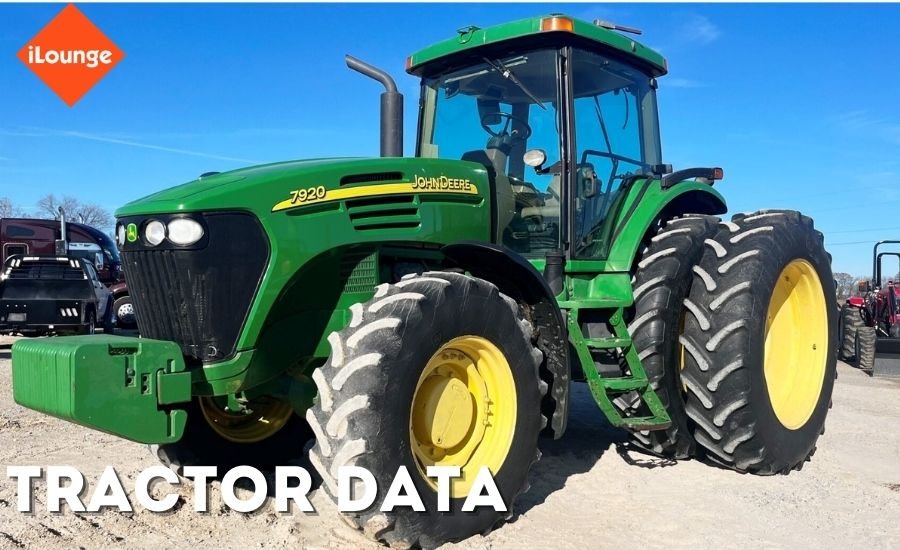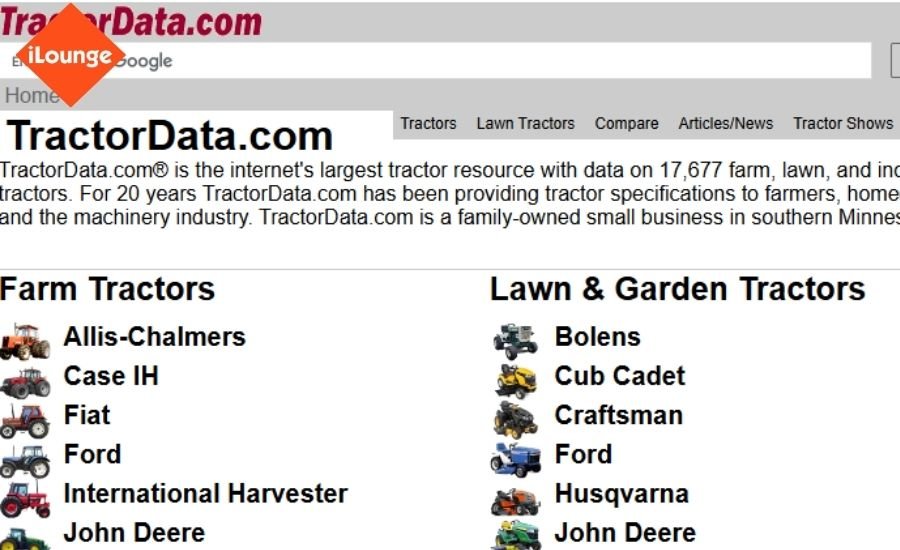Unlocking the Power of Tractor Data: The Ultimate Guide to Modern Farming Efficiency

In today’s world of precision agriculture, one thing stands out as the key to unlocking greater productivity and efficiency: data. Specifically, tractor data has emerged as a crucial resource for farmers, helping them make informed decisions about everything from equipment maintenance to field management. As the backbone of modern farming, tractors have evolved into sophisticated machines capable of collecting and transmitting valuable information. With this article, we aim to dive deep into the world of tractor data and explore how it’s revolutionizing agriculture. This guide will help farmers, tractor enthusiasts, and industry professionals get a comprehensive understanding of tractor data and how to harness its potential.
What Is Tractor Data?
Tractor data refers to the various metrics and information collected by a tractor’s onboard systems. This data can cover everything from fuel efficiency and engine performance to GPS positioning and soil conditions. Modern tractors are equipped with sensors, GPS systems, and telemetry that allow for the constant monitoring of both the tractor’s performance and the surrounding environment. By gathering this data, farmers can make data-driven decisions that improve efficiency, reduce downtime, and increase yields.
Types of Tractor Data
Understanding the different types of tractor data is crucial for anyone looking to make the most of it. Below are some key categories of data that modern tractors can collect:
Engine and Performance Data
This includes information about the tractor’s engine temperature, oil pressure, and fuel consumption. Farmers can monitor this data to ensure the tractor runs efficiently and catch any potential issues before they lead to costly repairs.
GPS and Field Data
GPS technology allows tractors to operate with pinpoint accuracy, especially in large fields. Farmers can track the tractor’s position in real time, monitor the progress of planting or harvesting, and ensure that every inch of the field is covered.
Soil and Environmental Data
Advanced tractors can collect data on soil moisture, temperature, and even nutrient levels. This data type is invaluable for precision agriculture, helping farmers optimize irrigation and fertilization efforts.
Machine Health and Maintenance Data
Tractors can alert operators when maintenance is needed, such as oil changes, filter replacements, or tyre checks. Regular maintenance data helps prevent breakdowns, extends the lifespan of equipment, and ensures the tractor is always in top working condition.
Operational Data
This includes data on the hours the tractor has been running, the speed at which it operates, and the types of tasks it’s performing. By analyzing operational data, farmers can optimize workflows and get the most out of their machinery.
Why Is Tractor Data Important for Farmers?
The rise of tractor data has transformed how farmers approach their work. Here are some key benefits:
- Increased EfficiencyWith real-time data at their fingertips, farmers can adjust operations on the fly. Whether optimizing fuel use or adjusting planting depths based on soil conditions, tractor data enables more efficient use of resources.
- Better Decision-MakingTractor data provides insights that help farmers make informed decisions. For example, data on soil moisture can help determine the optimal times for planting, reducing the risk of crop failure.
- Preventative MaintenanceAccess to machine health data allows for preventative maintenance, meaning farmers can fix minor issues before they become significant problems. This reduces downtime and ensures tractors are always ready for the next job.
- Cost SavingsBy monitoring fuel consumption and engine performance, farmers can reduce fuel costs and extend the lifespan of their tractors. Additionally, precision farming techniques driven by tractor data can lead to more efficient use of seeds, fertilizers, and water.
How Tractor Data Drives Precision Agriculture
Precision agriculture, or “smart farming,” is the practice of using technology and data to improve farming practices. Tractor data is critical to precision agriculture because it allows for more accurate and efficient farming techniques. Here’s how tractor data plays a role:
- Variable Rate Technology (VRT)
With the help of tractor data, farmers can apply seeds, fertilizers, and pesticides at variable rates based on the specific needs of each part of a field. This reduces waste and increases crop yields.
- Autonomous Tractors
The future of farming involves autonomous tractors that can operate without human intervention. These tractors rely on tractor data to navigate fields, avoid obstacles, and perform tasks such as planting and harvesting with precision.
- Irrigation Management
Tractor data on soil moisture and weather conditions can help farmers develop more efficient irrigation strategies, ensuring crops get the right amount of water without waste.
- Yield Monitoring
By collecting data on crop yields during harvest, farmers can identify trends and make adjustments for future planting seasons. This data-driven approach leads to higher productivity and better use of land.
The Future of Tractor Data: AI and Machine Learning
As technology continues to evolve, the potential of tractor data is set to grow exponentially. Artificial Intelligence (AI) and Machine Learning (ML) are two areas that will significantly impact how tractor data is used. Here’s what the future holds:
- Predictive MaintenanceWith AI, tractor data can be analyzed to predict when a tractor will likely experience a breakdown. By identifying patterns in the data, AI systems can alert farmers to maintenance needs before they become urgent.
- Autonomous Decision-MakingAs tractors become more autonomous, AI will play a role in decision-making processes. For instance, AI could analyze tractor data to determine the best times for planting, harvesting, or irrigating crops.
- Enhanced Precision FarmingMachine Learning algorithms can analyze historical data and provide insights on optimizing farming practices. For example, ML could help farmers identify the most productive parts of their fields and suggest changes to planting strategies.
Key Challenges and Solutions with Tractor Data
While tractor data offers numerous benefits, there are also challenges to consider:
Data Overload
Modern tractors generate vast amounts of data, which can overwhelm farmers. The solution lies in using data management software that organizes and filters the data, making it easier to interpret and use.
Data Security
With tractors becoming increasingly connected, the risk of data breaches grows. Ensuring that data is stored securely and that farmers have control over it is essential for protecting privacy and proprietary information.
Cost of Technology
Not all farmers can afford the latest tractor technology that collects and analyzes data. However, as technology advances, the cost is expected to decrease, making tractor data accessible to a broader range of farmers.
Integration with Other Systems
For farmers to make the most of tractor data, it must be compatible with other systems used on the farm, such as irrigation controllers or drone technology. Interoperability between systems will be a critical factor in the future.
Must Read: Fintechzoom-Com
How to Make the Most of Tractor Data on Your Farm

Farmers looking to take advantage of tractor data should start by investing in equipment capable of collecting the correct data. Here are some steps to get started:
- Choose the Right TractorNot all tractors are created equal when it comes to data collection. Look for tractors equipped with sensors, GPS, and telematics that can provide the data you need.
- Invest in Data Management SoftwareManaging tractor data requires specialized software to help you analyze and interpret the information. Look for software solutions that integrate your existing systems and provide actionable insights.
- Train Your TeamCollecting tractor data is just the first step. You’ll need to train your team to use the data to make decisions and improve farming practices.
- Collaborate with ExpertsData can be complex, and farmers may benefit from collaborating with agronomists or technology experts who can help interpret the data and provide recommendations.
Conclusion
In today’s fast-evolving agricultural landscape, tractor data is a game-changer for farmers seeking to optimize their operations. From boosting efficiency and reducing costs to driving the future of precision agriculture, the role of tractor data cannot be overstated. By embracing this technology and staying ahead of the trends, farmers can ensure their businesses remain competitive and sustainable for years. As we move forward, the continued integration of AI and machine learning with tractor data promises to usher in even more significant advancements in farming technology. For those ready to embrace the future, tractor data is the key to unlocking new levels of productivity and success.
By understanding and utilizing tractor data, you’re not just keeping up with the times—you’re driving the future of agriculture.
FAQs
Q: What is tractor data?
A: Tractor data refers to the information collected by a tractor’s onboard systems, including engine performance, GPS positioning, and soil conditions.
Q: How does tractor data help farmers?
A: Tractor data helps farmers make informed decisions, increase efficiency, reduce fuel costs, and improve crop yields by using real-time insights.
Q: What type of data do modern tractors collect?
A: Modern tractors collect engine performance data, GPS location, soil moisture, and machine health data.
Q: How can tractor data improve maintenance?
A: Tractor data can alert farmers to maintenance needs, helping prevent breakdowns and extending the life of the equipment.
Q: Is tractor data valuable for precision farming?
A: Yes, tractor data is essential for precision farming, allowing farmers to optimize planting, irrigation, and fertilization processes.
Q: Can tractor data help reduce farming costs?
A: Yes, by optimizing fuel use, reducing waste, and improving overall efficiency, tractor data helps lower farming costs.
Q: What are the future trends in tractor data?
A: Future trends include AI and machine learning to predict maintenance needs and improve autonomous tractor operations.
Up Next, Don’t Miss This: 66ez

Specializing in insightful and engaging articles across a range of topics. With a keen eye for detail and a passion for delivering high-quality information, Mary helps readers stay informed with the latest trends and updates


